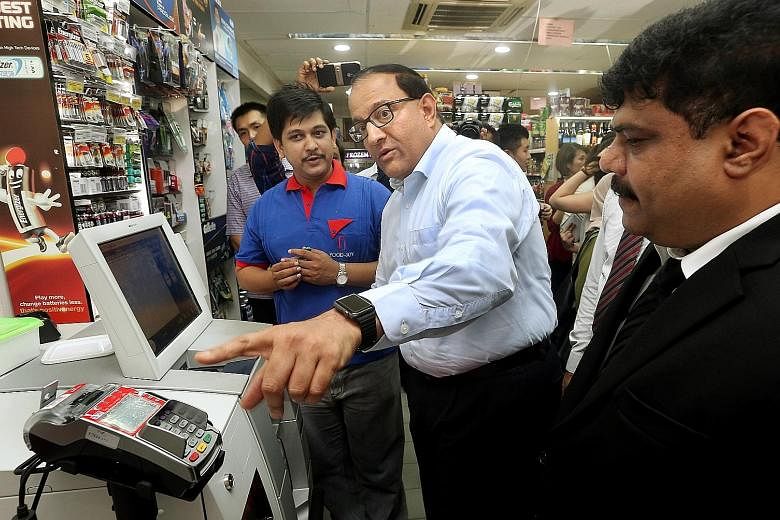Self-checkout machines are no longer limited to supermarket chains and fast-food outlets.
Even micro-retailers such as minimarts are adopting them in Singapore's push for retail productivity.
One of the early adopters is Food-Joy in South Buona Vista Road. In January last year, the company invested in its first self-checkout counter with the support of Spring Singapore's Capability Development Grant, which covers up to 70 per cent of the cost. After a successful pilot, it decided to buy a second machine two months later.
From two manned checkout counters, the store now has two machines and one manned checkout counter, which is needed for the sale of controlled items such as alcohol and cigarettes.
Queueing time has been reduced from about three minutes to one minute per customer, increasing the number of sales transactions a day by about 15 per cent, said general manager S. Janakiraman yesterday during a learning journey at Food-Joy for small and micro-retailers, attended by Minister for Trade and Industry (Industry) S. Iswaran.
Revenue was up 20 per cent last year compared with 2015, said Mr Janakiraman, who handled the self-checkout counter project.
The number of manned cashiers has also been cut by half. "Our staff can free up time and take on new roles such as stock-taking and merchandising," said director of Food-Joy Tay Eng Khiam.
And, while cash counting previously took employees 20 minutes at the end of each day, the process now takes about two minutes.
Mr Iswaran said more small and micro-retailers should embrace the use of technology to enhance their growth and competitiveness.
"Scale should not be a barrier, as small businesses can collaborate with associations and industry partners to achieve the desired outcome," he said.
But with each self-checkout machine at Food-Joy costing more than $50,000, most small and micro-retailers might find it tough to implement the technology, said Federation of Merchants' Association president Yeo Hiang Min.
To lower the barriers for entry, he said, leasing packages could be introduced to reduce the costs of adopting the self-checkout system.
The machines' size is also another key concern, as most minimarts are around 750 sq ft, said Minimart Association chairman Alan Tay. For the estimated 500 to 600 minimarts in Singapore to adopt a self-checkout system, he said, the machines will have to be much smaller compared with the ones used at Food-Joy, which has a store size of about 3,500 sq ft.
Instead of self-checkout systems, these smaller minimarts can consider adopting cash counting machines, which would also speed up the checkout process without taking up a lot of space, said Mr Tay.


